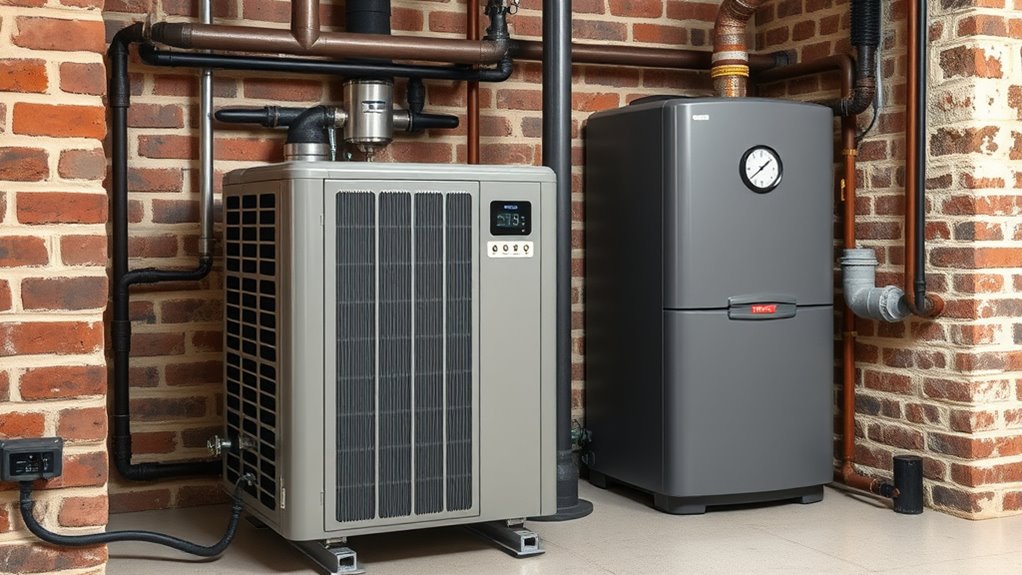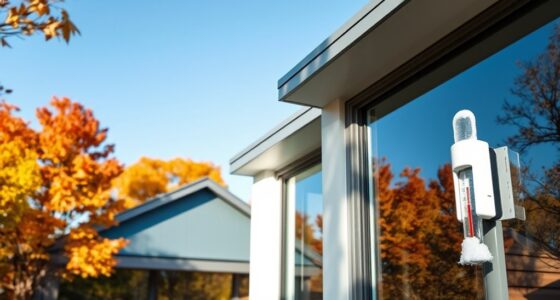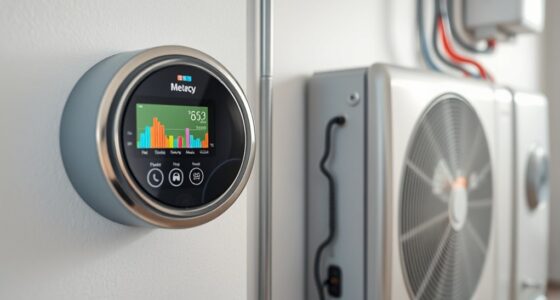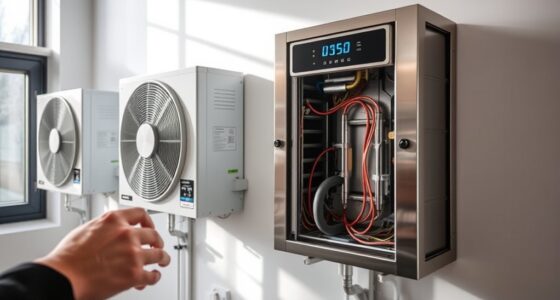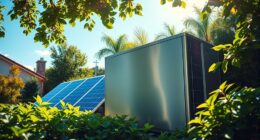Heat pumps use electricity to transfer heat from the environment, making them much more efficient and cheaper to run than gas boilers, which burn fuel to produce heat. They often achieve a Seasonal Coefficient of Performance around 2.9, while gas boilers have higher energy loss, especially in cold weather. When powered by renewable energy, heat pumps emit virtually no greenhouse gases. If you want to understand how these differences affect your energy bills and carbon footprint, keep exploring the details below.
Key Takeaways
- Heat pumps have a higher Seasonal Coefficient of Performance (around 2.9), making them more energy-efficient than gas boilers.
- Gas boilers typically operate at 90–94% efficiency but lose performance in cold weather, increasing energy consumption.
- Heat pumps consume less energy at lower water temperatures (35–55°C), especially suitable for underfloor heating systems.
- Gas boilers require higher water temperatures (60–80°C), leading to increased energy use and lower efficiency.
- Overall, heat pumps can reduce household energy consumption and operational costs compared to traditional gas boilers.
How Do Heat Pumps and Gas Boilers Generate Heat?
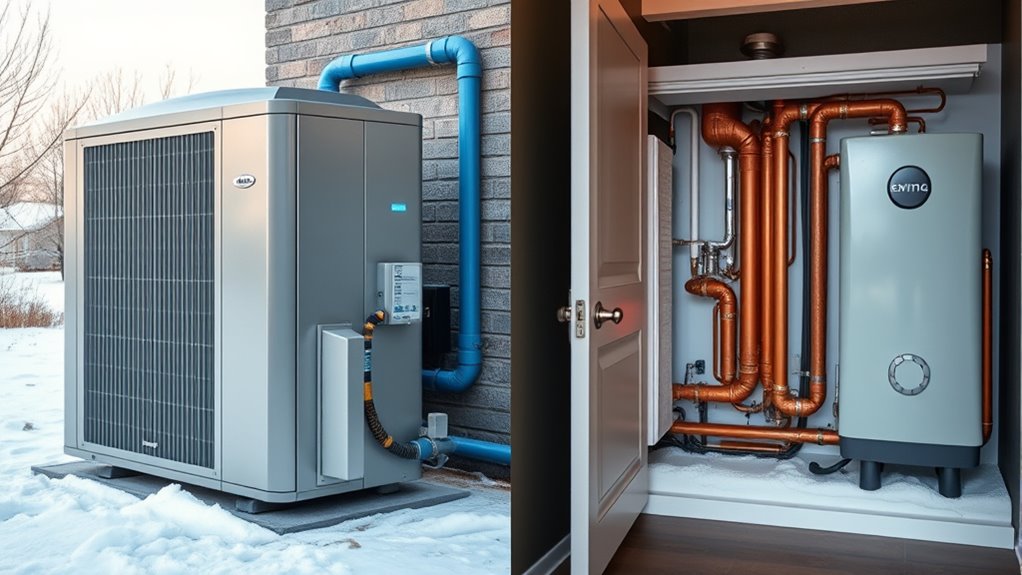
Heat boilers generate heat by burning natural gas or oil to produce hot water or steam, which then circulates through radiators or underfloor systems to warm your home. Gas boilers rely on combustion, where fuel reacts with oxygen, releasing heat that transfers to water through thermal transfer. This process produces emissions like CO₂, impacting the environment. In contrast, heat pumps use a refrigeration cycle to transfer heat from outside air or underground sources into your home, even in cold weather. They operate with higher energy efficiency because they move existing heat rather than generate it directly. While gas boilers depend on burning fuel, heat pumps leverage environmental heat, resulting in no greenhouse gases during operation. Both systems offer distinct methods of heat generation, tailored to different energy and environmental considerations, with renewable energy sources playing an increasing role in enhancing their sustainability. Additionally, advancements in heat pump technology are making them more efficient and adaptable for various climates.
Efficiency Metrics: Comparing Performance of Both Systems

When comparing efficiency, you should look at the Seasonal Coefficient of Performance (SCOP) for heat pumps and the efficiency percentage for gas boilers, as these metrics show how well each system converts energy into heat over time. Heat pumps typically deliver higher efficiency by transferring ambient heat, while gas boilers rely on fuel combustion, which limits their performance. Additionally, consider water temperature needs, since higher temperatures can impact system efficiency differently for each option. According to industry standards, performance metrics provide a comprehensive view of system efficiency and help in making informed decisions. Understanding the energy transfer process can also shed light on how different systems may harmonize with your household’s energy profile. Moreover, the environmental impact of each system can influence long-term sustainability and cost savings.
COP and Seasonal Efficiency
How do we accurately compare the efficiency of heat pump systems and gas boilers? You need to look at the Coefficient of Performance (COP), which measures heat pump efficiency by comparing heat output to electricity input. The Seasonal Coefficient of Performance (SCoP) accounts for varying outdoor temperatures over a heating season. Here are key points to contemplate:
- Heat pumps typically have a COP from 2.5 to 4.0, with a SCoP around 2.9, indicating good seasonal efficiency.
- Gas boilers usually operate at 90–94% efficiency, but the efficiency gap widens in colder weather as heat pump COP drops.
- Comparing heat pump vs gas boiler performance, higher SCoP values mean better energy consumption, especially during milder conditions.
- The seasonal variations in performance highlight the importance of considering environmental factors when evaluating efficiency metrics.
- Advances in heat pump technology continue to improve performance in colder climates, narrowing the efficiency gap with traditional systems.
- Incorporating renewable energy sources can further enhance the sustainability of heating systems and reduce overall energy consumption.
- As research progresses, the development of smarter control systems can optimize performance and reduce energy waste.
Additionally, ongoing innovations in system integration are making combined heating solutions more efficient and adaptable to different climates.
Water Temperature Needs
The temperature of the water supplied by heating systems directly impacts their efficiency. Gas boilers typically operate at high water temperatures of 60–80°C, which are necessary for traditional radiators but increase energy consumption and reduce efficiency. Heat pump efficiency peaks at lower water temperatures, around 35–55°C, making them ideal for underfloor heating or low-temperature radiators. As water temperature rises, heat pump performance declines because higher temperatures demand more energy to extract heat. Maintaining lower heating system temperatures not only improves heat pump efficiency but also minimizes energy use. Additionally, understanding the efficiency metrics of each system helps in choosing the most energy-effective solution for specific heating needs. Proper system design and temperature controls can further enhance overall efficiency and reduce operational costs. Using smart thermostats can help maintain optimal water temperatures and improve overall energy efficiency. Implementing advanced system controls can optimize performance and adapt to varying weather conditions, further improving energy savings.
Seasonal Performance and Real-World Energy Use

Seasonal performance of heat pumps varies markedly with outdoor temperatures, impacting their real-world energy use. When temperatures drop, heat pump efficiency can decline, especially in cold climates. However, modern cold climate models maintain high performance even below -13°F. To understand the impact, consider these points:
- Well-installed heat pumps can reduce household heating energy consumption by about 25% annually compared to gas boilers.
- Their energy use fluctuates with outdoor temperature, insulation quality, and system sizing, often requiring supplementary heat during peak winter. Additionally, the heating efficiency of heat pumps depends greatly on their design and installation quality.
- Gas boilers, while more consistent across seasons, typically convert fuel less efficiently, leading to higher energy consumption during the coldest months.
- Hyundai Tuning techniques can optimize system performance and efficiency, especially in vehicles and potentially in climate control systems.
- Advances in renewable energy integration, such as solar and wind, can help offset peak energy demands during cold weather periods, improving overall efficiency.
- Proper maintenance and system calibration are crucial to ensure heat pumps perform optimally in varying outdoor conditions.
- Additionally, insulation improvements can significantly reduce the energy required for heating, enhancing the overall efficiency of heat pumps during colder months.
Real-world data confirms that heat pumps can be highly effective, but their performance depends heavily on outdoor temperature and home insulation.
Impact of Home Insulation on Energy Consumption
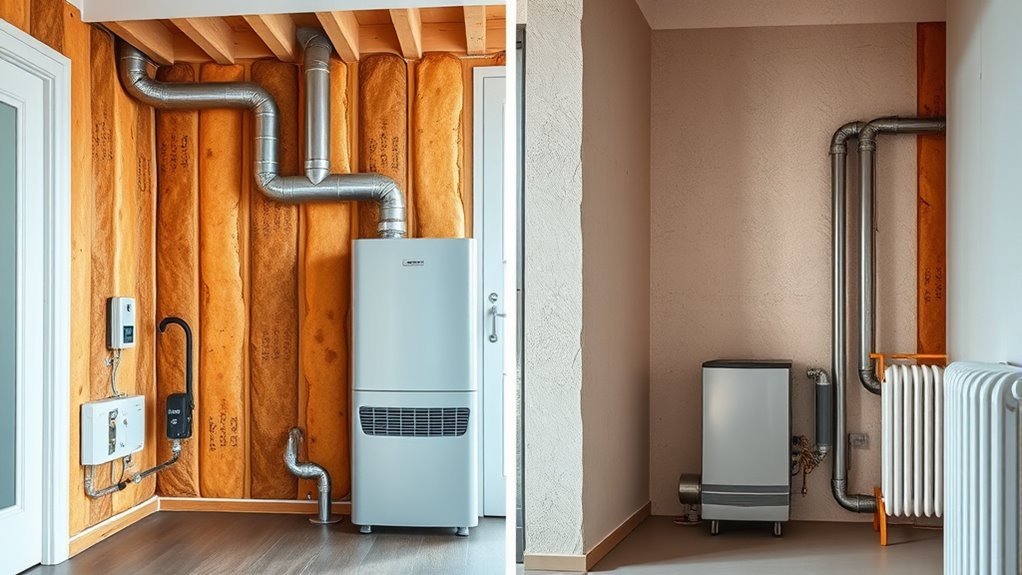
Your home’s insulation plays a vital role in how efficiently your heating system uses energy. Proper insulation reduces heat loss, which directly improves the performance of heat pumps and gas boilers. Upgrading insulation before installing or optimizing your heating system can lead to significant energy savings and better overall efficiency. Incorporating vertical storage solutions and organized zones can further enhance your home’s energy management by reducing unnecessary clutter and improving airflow. Additionally, effective insulation helps stabilize indoor temperatures, reducing the workload on your heating system and promoting energy efficiency.
Insulation’s Role in Efficiency
Proper home insulation plays a vital role in enhancing energy efficiency by reducing heat loss, which allows heating systems to operate more effectively. When your home is well-insulated, both heat pumps and gas boilers perform better, but heat pumps benefit even more because they require lower water temperatures for peak efficiency. Poor insulation causes increased heat loss, forcing heat pumps to work harder and consume more electricity, reducing their advantages. To maximize thermal performance and energy efficiency:
- Proper insulation minimizes heat loss and improves heat pump efficiency.
- Well-insulated homes lower overall energy consumption and operational costs.
- Adequate insulation enhances home heating comfort and system performance.
- Hybrid bicycles are an all-in-one solution for diverse cycling needs, promoting eco-friendly transportation and physical activity.
- Insulation quality can directly influence the effectiveness of energy-saving measures and overall system performance.
- Ensuring proper home insulation also helps prevent drafts and cold spots, further boosting energy savings.
Inadequate insulation hampers efficiency and increases energy costs, making home insulation essential for maximum heat pump performance and reduced heat loss.
Heat Pump Performance Factors
Home insulation directly influences how effectively heat pumps perform and how much energy they consume. The insulation impact is vital in reducing outdoor heat loss, which helps maintain heat transfer and indoor temperature stability. Well-insulated homes improve heat pump efficiency, especially in cold weather, by minimizing heat escape and allowing the system to operate more effectively. This not only reduces energy consumption and operational costs, as the heat pump doesn’t have to work as hard to heat your home, but also enhances overall system performance. Proper insulation also extends the system lifespan by decreasing strain on components. Additionally, sealant and weatherproofing techniques can further improve insulation effectiveness by preventing drafts and heat leaks. Good insulation not only conserves energy but also supports sustainable heating practices by lowering environmental impact. Ultimately, good insulation maximizes energy savings, guarantees consistent comfort, and enhances heat pump performance across seasons. Poor insulation, conversely, causes higher energy use and less reliable cold weather performance. Incorporating insulation standards ensures that energy efficiency is maintained and optimized in any heating setup.
Operating Costs Over Time: Are Heat Pumps More Economical?

Are heat pumps more economical over time than traditional gas boilers? Yes, their lower operating costs and higher efficiency make a compelling case. Over time, heat pumps typically have annual costs of around £1,156, compared to £1,302 for gas boilers, saving you about £146 annually. Their superior energy efficiency means they convert electricity into heat more effectively, reducing overall energy consumption. Consider these points:
Heat pumps save money long-term with lower operating costs and higher efficiency.
- Well-installed heat pumps with good insulation can achieve a high Seasonal Coefficient of Performance (SCoP), lowering ongoing expenses.
- Rising electricity prices are offset by efficiency gains, keeping operating costs competitive.
- Despite higher initial installation costs, long-term savings in energy bills and maintenance often make heat pumps more economical over their lifespan.
In the cost comparison, heat pumps generally offer better long-term financial benefits.
Environmental Benefits and Emissions Profile
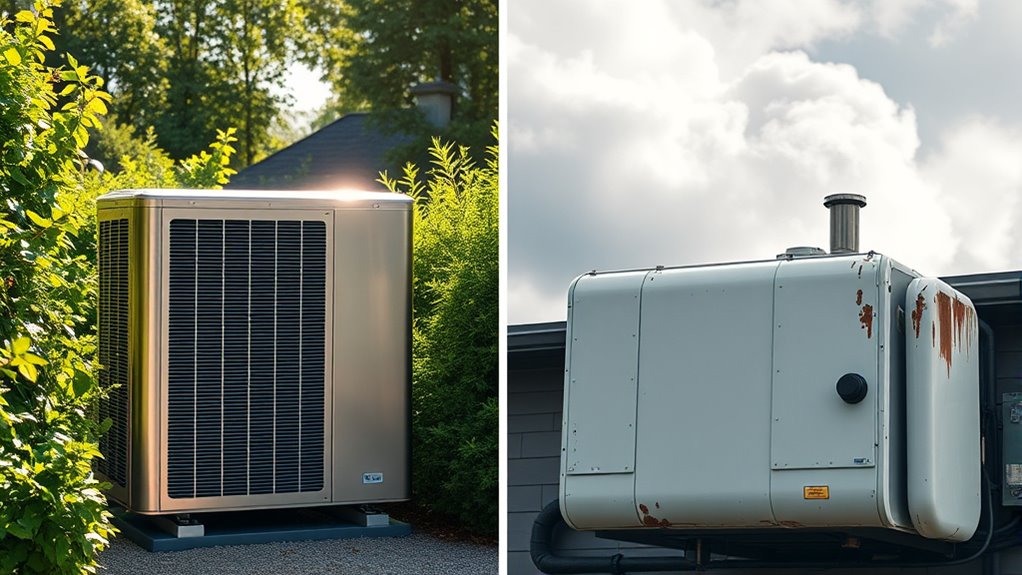
Heat pumps not only save you money over time but also offer significant environmental benefits. They drastically reduce carbon emissions and household carbon footprints by emitting no CO2 during operation, especially when powered by renewable energy. Compared to gas boilers, which emit about 0.215 kg of CO2e per kWh, heat pumps with renewable electricity can reach near-zero emissions, making them a cleaner choice. Their emissions profile supports climate change mitigation by lowering greenhouse gases released into the atmosphere. Switching to heat pumps helps cut household greenhouse gas emissions by around 75%. While biomass and hydrogen options are low-carbon, their environmental advantages depend on sustainable resource management. Overall, heat pumps provide a greener alternative, contributing to a cleaner environment and more sustainable future.
Factors Influencing Actual Energy Consumption in Homes
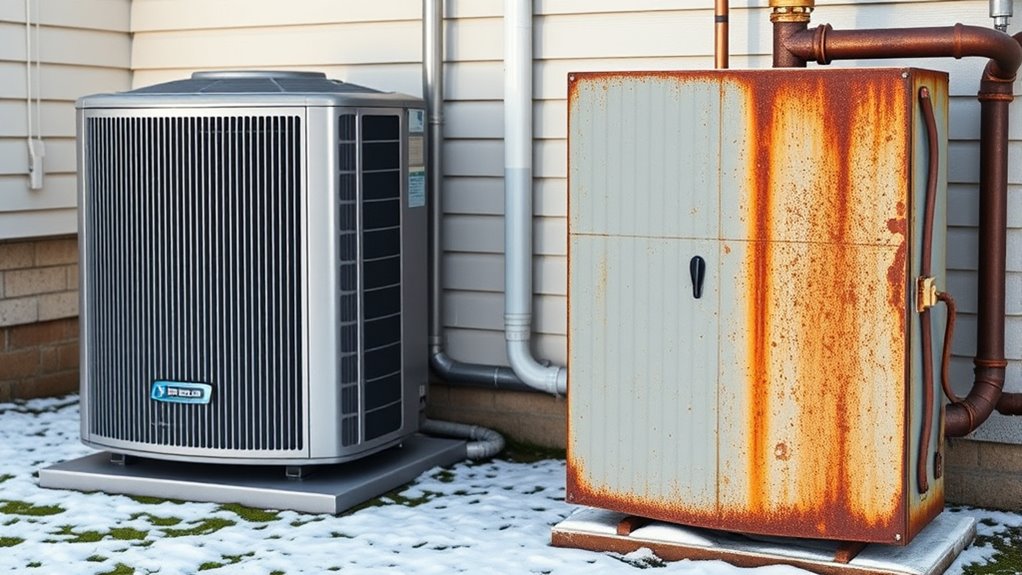
The actual energy consumption of heat pumps compared to gas boilers varies markedly depending on several key factors. Your home’s insulation quality plays a crucial role—well-insulated homes maximize heat pump efficiency and lower energy use. The Seasonal Coefficient of Performance (SCoP) impacts real-world efficiency; heat pumps often achieve around 2.9, while gas boilers operate at 90-94% efficiency. External temperature fluctuations also matter; colder climates reduce heat pump efficiency, increasing electricity consumption. Additionally, your home infrastructure, such as radiator types and water temperature settings, influences overall energy use. Consider these points:
- Insulation and climate conditions
- Water temperature and radiator compatibility
- Energy prices and tariffs affecting operational costs
All these factors shape the actual energy consumption you’ll experience with either system.
Frequently Asked Questions
Is It Cheaper to Run a Heat Pump or Gas Boiler?
You might find that running a heat pump is cheaper than a gas boiler, especially if you consider efficiency and energy costs. Heat pumps convert electricity into heat more efficiently, often lowering your bills. With current electricity tariffs and proper installation, they tend to be more economical in the long run. Gas prices are higher, so unless your home is very well insulated, a heat pump could save you money over time.
Is a Boiler More Efficient Than a Heat Pump?
You might think boilers are more efficient because they directly burn fuel, but heat pumps actually outperform them. Heat pumps transfer heat more effectively, achieving efficiencies of 300–400%, while boilers operate at about 90–94%. This means heat pumps use electricity more wisely, converting it into heat with less waste. So, in most cases, a heat pump is more efficient than a boiler, especially with renewable electricity powering it.
Is It Cheaper to Heat With a Heat Pump or Gas?
This question could save you a fortune—you’re looking at big savings. Generally, heat pumps are cheaper to run than gas boilers because they’re more efficient, converting more electricity into heat. Even though electricity costs more than gas, the higher efficiency means you’ll use less energy overall. With rising gas prices, a well-installed heat pump can cut your heating bills profoundly, making it the smarter, more economical choice in the long run.
Are Heat Pumps More Energy Efficient Than Gas?
You’re asking if heat pumps are more energy efficient than gas. The answer is yes. Heat pumps typically have a higher efficiency because they produce three units of heat for every unit of electricity they use, thanks to their high Seasonal Coefficient of Performance. In contrast, gas boilers convert fuel directly into heat with slightly lower efficiency. So, overall, heat pumps use less energy to provide the same amount of warmth.
Conclusion
Did you know heat pumps can be up to three times more efficient than gas boilers? If you’re looking to cut energy costs and reduce your carbon footprint, switching to a heat pump could be a smart move. With their impressive efficiency, especially in well-insulated homes, they offer long-term savings and environmental benefits. Making this change not only helps your wallet but also contributes to a greener future.
